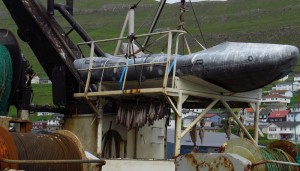
A small collection of islands in the North Sea, a few hundred miles south of the Arctic Circle, is preparing for war. The European Union, under the auspices of an international fisheries management agreement, is ready to levy heavy trade sanctions against the Faroe Islands, an independent protectorate of Denmark. The Faroes, with a population of less than 50,000, intends to fight these sanctions, defy EU authority, and defend their economic independence. The object of contention is the right to fish Atlanto-Scandian Herring; the driving force behind this dispute–dramatic shifts in fish distribution brought on by warming seas and altered currents. This may be the first international conflict directly attributable to climate change. It will not be the last. Regardless of the outcome, this confrontation will set a precedent for future climate conflicts. Welcome to the Herring War.
Despite their uninspiring name, herring are a rather handsome fish. Atlantic herring, Clupea harengus, are relatively small with a classically “fishy” (fusiform) body shape. They are among the most abundant fish in the ocean, forming schools that can number in the billions. Along with other planktivorous fishes, such as menhaden, that convert phyto- and zooplankton into higher trophic-level biomass, herring are critical to ocean food-webs. They are considered to be among the most important fish in the sea. Herring are the dominant prey species for many large, pelagic predators like tuna, sharks, marine mammals, salmon, and sea birds, among others. Their dominant predator, unsurprisingly, is us.
Read More “Herring Wars: Quotas, Conflicts, and Climate Change in the North Atlantic” »